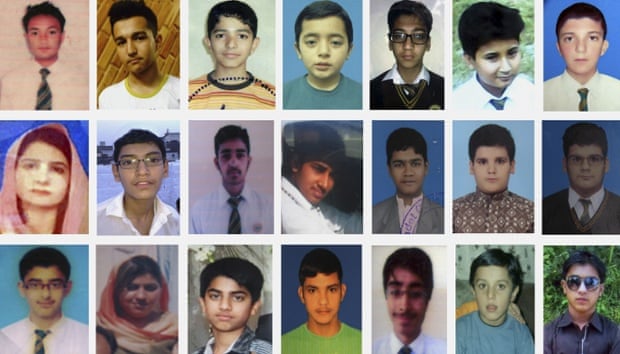Decades of state support for jihadis has led to national confusion over who the real enemies are. But the latest attack might be a watershed.
It is not just the survivors of Tuesday’s assault on Peshawar’s Army Public School who have been reliving the nightmarish attack that left 132 teenage boys dead. The entire country has been traumatised by graphic accounts of gunmen spraying bullets into a hall full of children and then later sadistically killing others after checking whether their parents served in the military.
On Wednesday, Pakistan’s army made a point of letting scores of television crews trample over the crime scene in order that they could broadcast pictures of rooms blasted by suicide bombers, floors covered with pools of barely dried blood, and the sad detritus of an ordinary school day suddenly interrupted by seven terrorists.
Rifaat Hussain, an academic, said the military was trying to generate a commodity that has long eluded Pakistan: a national consensus to fight terrorism. “The army had already decided Pakistan will never know peace or become a normal country unless these guys are put out of business, but they are using this horrific event to drive the point home,” he said.
That Pakistan should need any encouragement to tackle a problem that has claimed 50,000 lives since 2001 baffles outsiders. But decades of state support for jihadist groups, combined with reluctance by politicians to confront violent groups, has led to a national confusion over who Pakistan’s enemies are.
In the aftermath of Tuesday’s attack, politicians and many members of the public were unwilling to say publicly whether they thought the Taliban had really carried out the atrocity, even though the Islamist movement’s franchise in the country – the Tehreek-e-Taliban Pakistan (TTP) – had wasted no time in claiming responsibility.
At Friday prayers few mullahs dared utter the word “Taliban”, with many shifting the blame on to vague conspiracies hatched by the west. “May God bless the departed souls and give courage to bereaved families,” the cleric of one unexceptional mosque in a prosperous area of Islamabad told the worshippers, before adding: “May God foil the conspiracies of the Jews and infidels aimed at dividing the Muslims.”
Such statements are what Pakistani journalist Ejaz Haider calls “whataboutery”. “When you say we have a real problem here, the other side will say ‘what about the Americans inAfghanistan?’, or ‘what the western world is doing’, or ‘what the Israelis are doing’,” he said. “It is part of the extremist mindset which has seeped deep into sections of society.”
Many blame Zia ul-Haq, the 1980s military ruler and hardline Islamist who massively increased Pakistan’s use of militants as proxy warriors in its struggle to dominate Afghanistan and win control of Indian-controlled Kashmir. Backed by US and Saudi money, Pakistan created a vast infrastructure of radical religious schools and training camps. The “mujahideen” that resulted were sold to the public as heroes of Islam who kicked the Soviet Union out of Afghanistan. Generations of schoolchildren have since been brought up on textbooks praising holy war and vilifying Hindus and India.
Pakistan repeated the trick in the 1990s, sending jihadists to stoke insurgency in Indian-held Kashmir and giving massive assistance to the Taliban, the once lowly mullahs’ movement that had seized control of Afghanistan in 1989.
Even after the al-Qaida attacks on the US in 2001, Pakistan refused to abandon the Taliban, despite being a nominal ally of the western powers who toppled Islamabad’s client regime in Afghanistan. Pakistan continued to shelter the Taliban, even as some militants, feeling betrayed by the country, turned against their old masters with attacks on the country, such as the 2008 truck bombing of the Marriott Hotel in Islamabad.
This is the bizarre-sounding phenomenon known as “good Taliban” and “bad Taliban” that for a decade has sown deep confusion among the Pakistani public and infuriated western powers. As Hillary Clinton put it in her 2011 warning to Islamabad, “you can’t keep snakes in your backyard and expect them only to bite your neighbours”.
Some are now daring to hope that Pakistan has finally learned its lesson. Sartaj Aziz, Pakistan’s acting foreign minister, described the attack as “our 9/11” and a “game changer” that has finally exposed the futility of targeting some groups but not others.
“It was realised that in the end they support each other and that if you do this you’re creating space which can become dangerous in the future,” he said.
On Wednesday the prime minister, Nawaz Sharif, announced that “there will be no differentiation between ‘good’ and ‘bad’ Taliban”.
The end of Pakistan’s disastrous “double game” has been predicted before. This time around, optimists are encouraged by new leadership in the region. The Afghan president, Ashraf Ghani, is determined to improve relations with Pakistan, which under Sharif also has a civilian government interested in trade rather than proxy wars.

There are also high hopes for General Raheel Sharif, the powerful army chief appointed last year, who in June sent troops into north Waziristan, the infamous terrorist sanctuary bordering Afghanistan where many politicians had long dreaded a showdown with the TTP. On Tuesday both Sharifs ordered an immediate blitzkrieg against the TTP, with revenge air strikes on militant hideouts even as Peshawar’s hospitals were still filling with casualties.
Dozens of alleged militants have been killed since by aircraft, ground assaults and “encounters” by security forces around the country. On Friday night Pakistan executed its first two prisoners since 2008 after abandoning a death penalty moratorium.
For all the action against the TTP, sceptics point out that there is no sign of the “good Taliban” being inconvenienced. In an attempt to remain in official favour, several groups responsible for atrocities against civilians rushed to denounce the Peshawar attack, including the Afghan Taliban and even a vicious TTP splinter group called Jamaat-ul-Ahrar. And in an astonishingly ill-timed move, a court on Thursday ordered the bailing of Zaki-ur-Rehman Lakhvi, mastermind of the 2008 attack on the Indian city of Mumbai, which killed 166 people. The government quickly promised to try to get the decision reversed after New Delhi expressed outrage.
Few analysts believe Pakistan is ready to take on Lashkar-e-Taiba (LeT), the militant group that Lakhvi co-founded and which is devoted to “liberating” Kashmir. With its huge corps of jihadists hardened by years of fighting in Kashmir, it is arguably too big to confront at a time when Pakistan is battling the TTP.
In a country with weak public services, the LeT has worked hard to ingratiate itself with ordinary Pakistanis through its welfare organisation, the Falah-e-Insaniyat Foundation (FIF). It is now one of the largest charities in the country, running ambulance services in nearly 200 cities and towns, as well as six hospitals and hundreds of schools. In Peshawar last week hundreds of FIF activists wearing fluorescent jackets were helping survivors in hospital and hanging around funerals. The group’s leader, Hafiz Saeed, is subject to a $10m US bounty, but he moves around Pakistan freely. This week heclaimed India was responsible for the attack in Peshawar.
Then there are Pakistan’s vicious Sunni supremacist groups responsible for killing minority Shias. Despite their crimes, Sharif’s faction of the Pakistan Muslim League has been accused of striking electoral pacts with them in his heartlands of Punjab province. The biggest battle of all, though, will be to overcome decades of pro-jihad propaganda that has made many Pakistanis susceptible to conspiracy theories, such as the view that the shooting in the head of schoolgirl Malala Yousafzai was a “drama” staged by western powers.
Last week a couple of hundred people attempted to push back against such noxious narratives by protesting outside Islamabad’s Red Mosque, a bastion of Taliban sympathisers that could not bring itself to unequivocally condemn the Peshawar attacks. But as the night echoed with chants denouncing Taliban apologists as traitors,some in the crowd quietly admitted their doubts. “We’ve been at this point before,” said Sarwar Bari, a journalist, recalling a similar outrage sparked in 2009 by a video of a Talib flogging a woman in Swatwho was accused of adultery. “There was a great hue and cry and everyone came out – but pretty soon the mullahs sabotaged the consensus and it all went quiet again.”

No comments:
Post a Comment